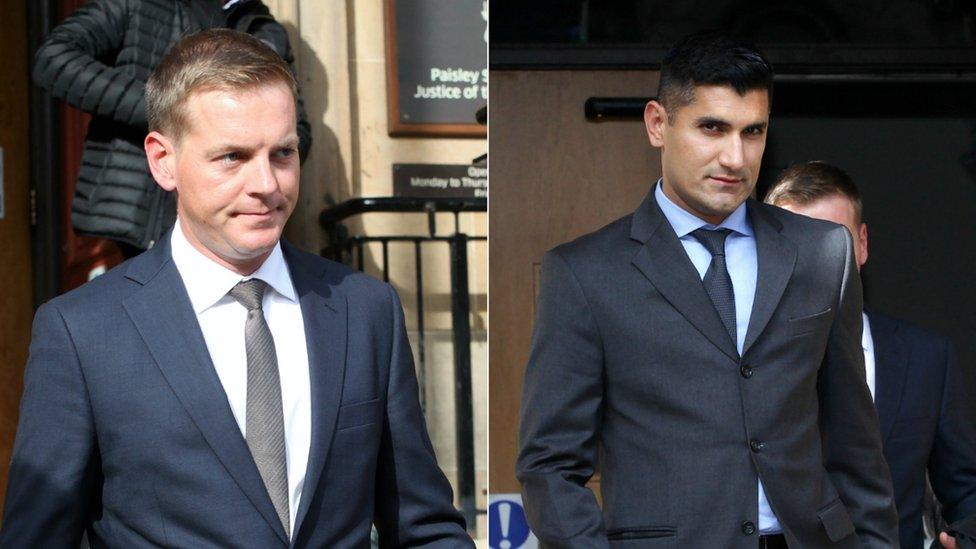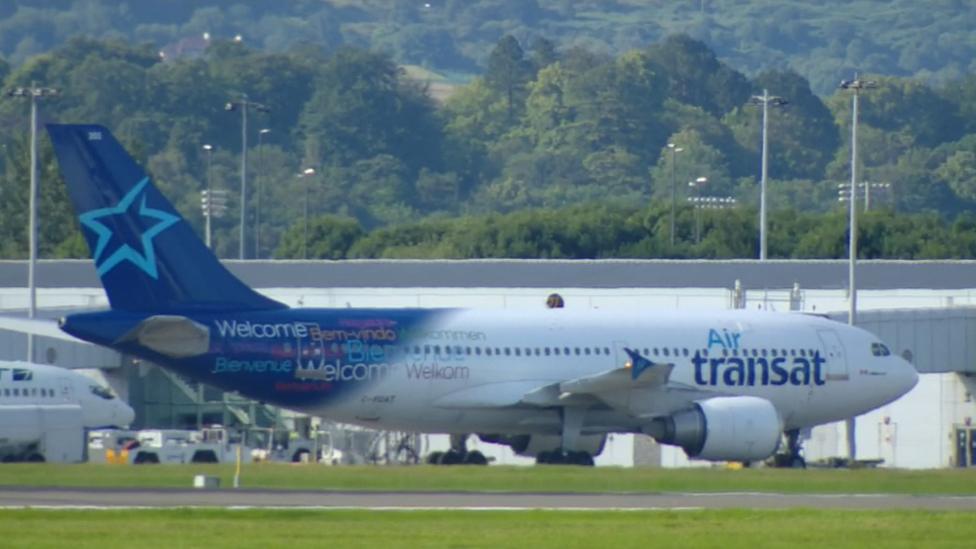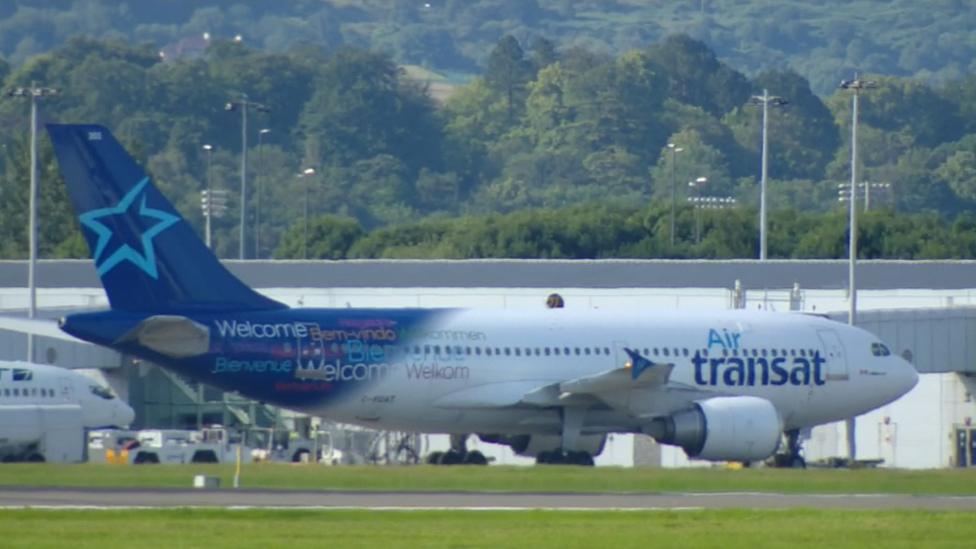'Alcohol' pilots cleared after evidence blunder
- Published

Captain Perreault and First Officer Syed were arrested shortly before taking off from Glasgow airport
Two pilots accused of planning to fly a passenger jet from Scotland to Canada while under the influence of alcohol have been cleared after key evidence was destroyed by prison staff.
Jean-Francois Perreault, 41, and Imran Zafar Syed, 39, were arrested in 2016, minutes before a flight from Glasgow to Toronto was due to take off.
Blood tests were said to have found them above the legal alcohol limit.
But the case collapsed when prison staff destroyed some of the samples.
The case was due to call at Paisley Sheriff Court on Thursday, but prosecutors offered no evidence against the men and the hearing was cancelled.
They will now be offered reinstatement by their airline and the chance to fly again once refresher training has been completed.
The Canadian pair were due to fly an Air Transat plane with 250 passengers on board when they were arrested at Glasgow Airport on 18 July 2016.
They were taken to Helen Street Police Station in Glasgow, where they were interviewed and blood samples were taken.
The charge stated that Captain Perreault had 32 milligrams of alcohol in 100ml of blood, while First Officer Syed had 49 milligrams in 100ml of blood.
The blood alcohol limit for flying is set at 20 milligrams.

The pilots were due to take control of this Air Transat Airbus A310
They were also accused of acting in a threatening manner and fighting at the Hilton Hotel in the city on the same day.
At the police station each blood sample was split in two - one of each for the prosecution and one for each pilot.
The pilots' samples were placed within their property, as they were in custody, and remained there during their initial court appearance, during which they were remanded in custody.
When the pilots arrived at Low Moss Prison in East Dunbartonshire, prison guard Paul Scoular said he thought the samples would be worthless evidentially and, along with prison nurse Mara Fraser, destroyed them.
'No protocol'
Mr Scoular, 46, gave evidence at a hearing in September, which can only be reported now the case has concluded.
He said he was "unsure" what to do as he had "no previous experience of receiving a blood sample in to custody" during his 20-year career working at Scottish jails - and he said no official protocol existed.
Mr Scoular said: "My understanding was they should've been stored and kept in a cooled environment.
"I asked Mara Fraser whether the samples would still have integrity or whether there may have been a deterioration due to them not being stored in a chilled environment.
"I spoke to Mr Syed and Mr Perreault and raised my concerns. I wasn't sure if it was worth retaining the sample."
He did not seek the advice of the police, prosecutors, or managers - and told the pilots he was going to destroy them
He added: "There was no facility in the prison for storing them. They both gave me a verbal consent to destroy it."
Prison nurse Mara Fraser, 54, said in evidence: "I informed him [Paul Scoular] I'd have to find out what to do with them.
"I put them in to a locked drawer in the nurses' office. None of the nurses knew what to do.
"I didn't know the protocol. I later found out the patients were liberated so I destroyed them [the samples] - I put them in to a sharps bin."
Lawyers for the pilots argued their right to a fair trial was compromised because there was now no opportunity for them to have the samples independently tested.

What the Railways and Transport Safety Act 2003 says
The pilots were arrested under section 93 of the Act.
It focuses on the limit of any alcohol consumption and says it is an offence to perform or prepare to perform certain aviation-related functions with more than a prescribed level of alcohol in the body.
That limit is set at 20 milligrams of alcohol per 100 ml of blood for those activities carried out by aircrew and air traffic controllers. In the case of breath, nine micrograms of alcohol in 100 ml are allowed and in urine the limit is 27 milligrams of alcohol in 100 ml.
The drink-drive limit in Scotland is more than twice the blood limit, which currently stands at 50micrograms in 100ml and reflects the speed of reaction needed by aircrew and air traffic controllers to respond to potential emergency situations.
Aviation functions can be defined as acting as a pilot during a flight, acting as navigator of an aircraft or as a flight radio-telephony operator during a flight, as well as acting as a member of the cabin crew.
Anyone convicted of committing an offence under the act can face up to two years in prison or a fine or both.

A Crown Office spokesman said: "It is the duty of the Crown to keep cases under review.
"After full and careful consideration of the facts and circumstances, including the recent decision of the Court of Appeal, Crown Counsel instructed there should be no further proceedings at this time.
"We are working with Police Scotland to ensure there are proper processes and guidance in place covering the retention and storage of samples when an accused person is remanded in custody."
Mr Perreault, of Ontario and Mr Syed of Toronto had denied all the charges against them.
Both men were suspended by their employer Air Transat following their arrest but will now be reinstated and offered the chance to fly again.
An Air Transat spokesman said: "We will be meeting with them in the next few days to plan their reinstatement since there is no charge against them and we have no evidence that they have broken any law nor our internal rules
"They will need to undergo retraining and requalification as per applicable legislation, and we will put in place measures to ensure that their behaviour is exemplary."
Justin Ryan and Colin McAllister were due to travel on the flight which was held up
Glasgow-based TV presenters and interior designers, Colin McAllister and Justin Ryan, were due to be on the flight to Canada.
They explained that passengers had been told the plane could not take off due to "operational reasons".
Mr Ryan, who along with Mr McAllister presented a TV show in Canada, said it was a "real hassle" that their flight had been delayed "first by a couple of hours, then by 21 hours, and then cancelled".
The flight eventually lifted off at 10:30 the following day and passengers received compensation from the airline.
- Published23 March 2017

- Published19 July 2016
